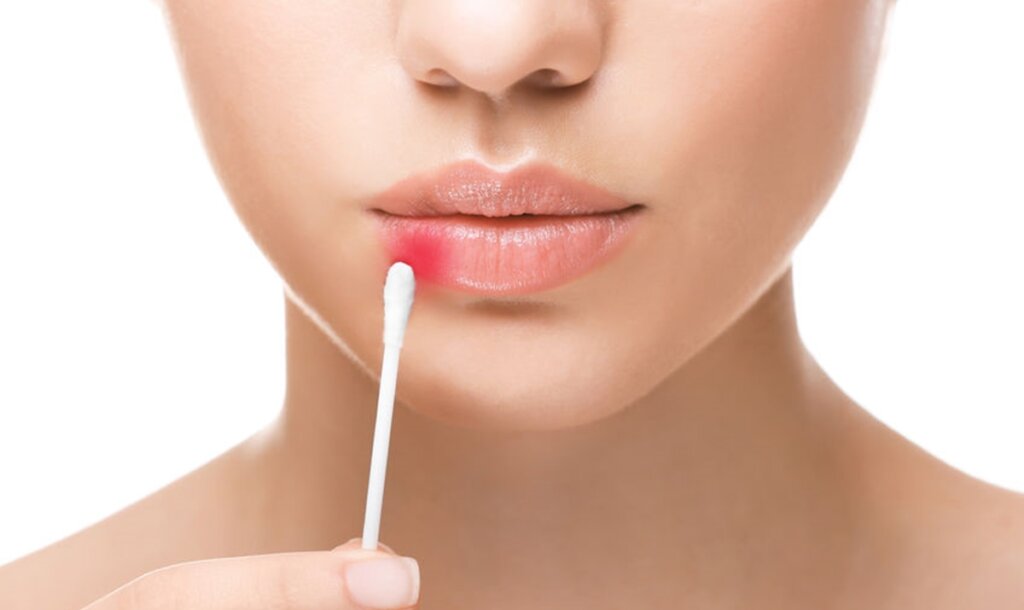Sometimes, when you go through a worrying time or excessive pressure, a few days later you find that an itchy cold sore appears on your lips. This is herpes due to stress, a common condition. An occurrence that demonstrates, once again, how your emotions can modify and alter your health and organic balance.
The classic herpes simplex (HS-1) viral infection always remains dormant in the body. You only have to have a slight fever or go through a few days of worry or mental tension for those small, but annoying cold sores to appear. However, there are other types of herpes that can appear along with stress, anxiety, or depression.
Some research mentions the impact of herpes zoster (vesicating and painful skin rash similar to chickenpox) or genital herpes in people suffering from mood disorders. This means it’s essential to delve much deeper into the relationship between the immune system and emotional disorders.
Herpes due to stress: symptoms, causes, and treatment
Herpes viruses are more complex than you might think. They have the peculiarity of hiding their genome, so it’s common for them to remain dormant for life. In fact, these organisms hijack the immune response pathos that mediate damaging stimuli and activate them instead.
That’s why the cold sores linked to herpes usually appear when you least expect it. For example, when you have a cold, during premenstrual syndrome, when you sunbathe a lot, or during periods of stress and anxiety.
The University of Helsinki (Finland) conducted research that claims herpes could be dangerous in some cases as there are different types and some are oncogenic. For instance, herpes simplex type 2, which manifests itself in the genital area, can sometimes occur with cervical cancer. Therefore, the fact that emotional disorders impact the reappearance of these types of latent viruses is a risk that must be considered and understood.
Herpes simplex (HS1) and stress
Herpes simplex (HS1) manifests as a mild illness and rarely causes more serious complications. It occurs with a low-grade fever and classic cold sores around the mouth or nose. Ohio State University (USA) conducted research that claimed that intense stress can affect immunity.
Indeed, this study showed that, along with all the physical symptoms that are often experienced with stress (muscle pain, headache, digestive disorders, etc.) the appearance of herpes simplex is also quite common.
Shingles and mood disorders
We know that herpes and stress are related and the type of stress suffered mediates the reactivation of one form of herpes or another. For example, experts tell us that chronic stress, suffered for months or years, can mediate the appearance of shingles.
The American Journal of Epidemiology published an interesting study in this regard in 2018. After conducting research with British and Danish populations, they discovered the following:
- Emotional disturbances are associated with an increased risk of shingles.
- Herpes zoster is an infection caused by the reactivation of the varicella-zoster virus. It presents with a skin rash on the face, chest, or back. In addition to the classic blisters, neuropathic pain also appears due to the inflammation of the nerves in the affected area.
- This type of herpes is only reactivated when a mood disorder has been present for weeks or months. It could be stress or depression.
- It’s also common for it to appear among people over 50 years of age.

Herpes simplex 2 and stress
Herpes simplex 2 (HS2) appears in the genital area and manifests itself with lesions on the skin and also on the internal mucous membranes. Recurrent stress also increases the likelihood that it’ll reappear. Indeed, while this sexually transmitted disease can come and go, the mood is often a trigger.
As we mentioned earlier, genital herpes carries certain risk factors. In fact, it increases the probability of suffering from cervical cancer. For this reason, women who suffer from herpes should undergo regular check-ups and follow any treatments with antiviral drugs prescribed by specialists.
Herpes phases
As a rule, herpes linked to stress usually lasts between seven and 12 days. Its natural course is as follows:
- Itching, tightness, and stinging of the affected area. This usually lasts between one to two days before herpes appears.
- Small fluid-filled blisters appear. They end up opening and forming a superficial and suppurating wound. This is the phase with the greatest risk of contagion. Therefore, sufferers must be careful and avoid contagion to third parties. As a matter of fact, even simple contact with the skin of a sufferer can transmit the virus.
- After a few days, healing begins, forming a dry scab that might bleed.
- Eventually, the scab heals and falls off on its own.
How to treat herpes caused by stress
The treatment of herpes caused by stress always involves understanding one key element, It’s the fact that, to this day, we still don’t fully understand the mechanism by which these types of viruses emerge, that are capable of remaining dormant and emerging unexpectedly.
Making them disappear is almost impossible. Therefore, you tend to get used to their reappearance when you’re sick, your defenses are low, or you’re suffering from an emotional disorder. Therefore, the most important thing is to first attend to your physical health.
Preventing the appearance of herpes
Good nutrition, protection against sexually transmitted diseases, and regular check-ups are recommended. Furthermore, it’s essential to have some basic strategies for dealing with everyday stress. Here are some simple tips:
- You must practice ‘good mental hygiene’. In other words, take care of everything you think and say to yourself. Negative self-talk and irrational thoughts are two of your greatest enemies.
- Learn to solve your problems before they become a mountain. Facing everyday challenges calmly, confidently, decisively, and with originality can be really useful.
- Relaxation and breathing techniques are healthy exercises you can carry out every day.
- Ensure you have someone to talk to. Also, enjoy your moments of leisure, and make time for yourself.
- Throw away razor blades, towels, forks, and lipsticks if you’ve had this type of herpes. By doing this, you’ll avoid the risk of a new infection.
Finally, although you may have become accustomed to suddenly getting a cold sore on your lip as a result of an exam, an interview, or a problem with your partner, you must remember one thing. Behind these manifestations are a series of emotions that you must attend to. That’s of the utmost importance.
The post Herpes Due to Stress: Emotions That Turn into Blisters appeared first on Exploring your mind.



















Comments